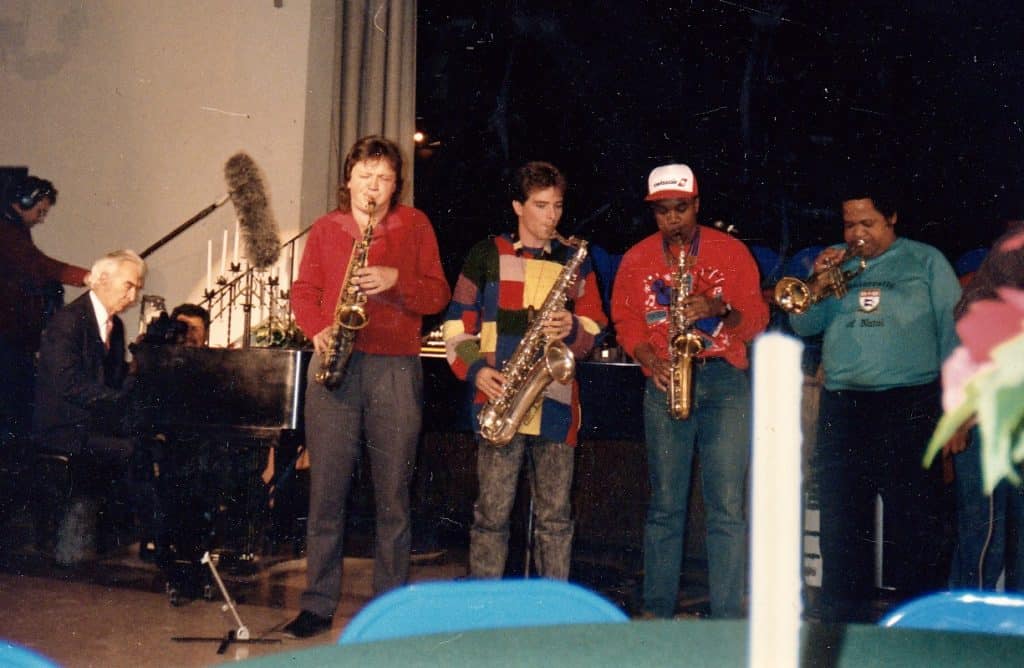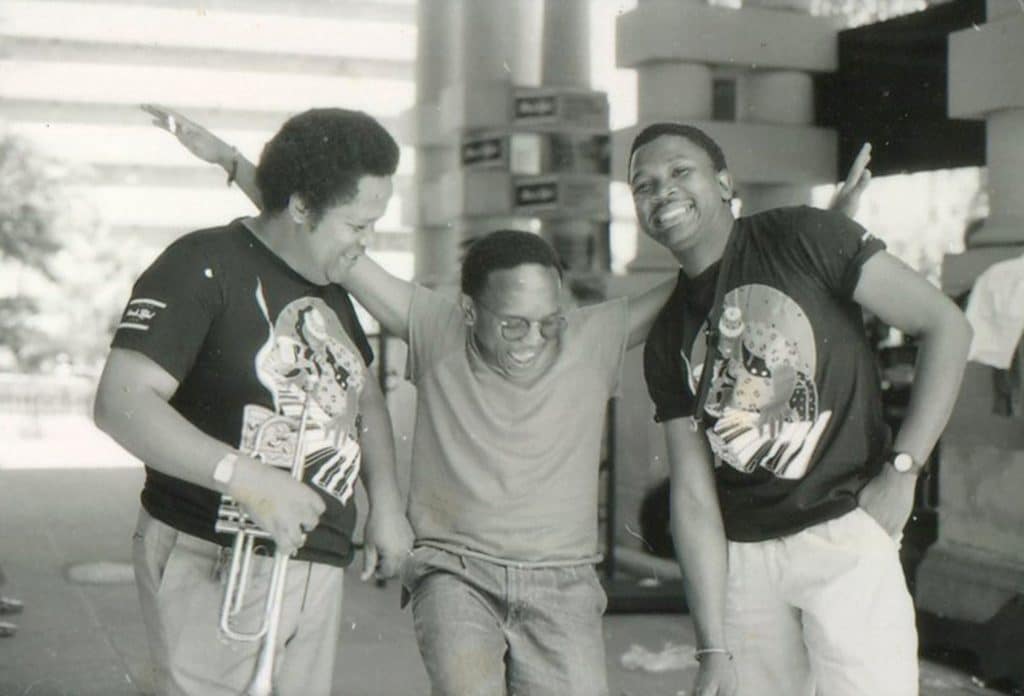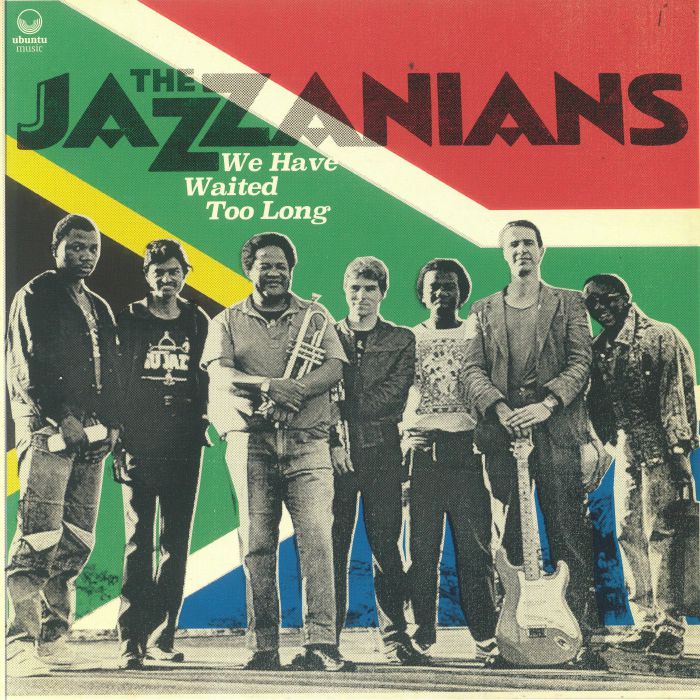Darius and Catherine Brubeck fully deserve the title of music pioneers and their groundbreaking work in setting up a jazz programme in South Africa, in the Apartheid era, is a triumph of dedication and progress.
The exploits of Catherine and husband Darius, son of jazz legend Dave Brubeck, are explored in the fascinating book Playing the Changes: Jazz at an African University and on the Road (University of Illinois Press) and live on in the continued triumphs of the Jazz Studies course they established at the University of KwaZulu-Natal in 1984. The music they created there lives on, including with the band The Jazzanians. The landmark 1988 album ‘We Have Waited Too Long’ was re-mastered and re-released on Ubuntu Music in April this year.
In a joint interview, Catherine, who is credited for “concept and management” for the album, recalled the inspiration for the recording. “We’re still not sure who thought of The Jazzanians for the name of the band, as at least three of us (including me) claim it as their idea,” she says. “Perhaps that in itself shows how united we were in achieving goals. One of these was a recording so that the music would last beyond the actual band. ‘We have Waited Too Long’ is the title of the album and a piece written by co-leader, Andrew Eagle. It’s importance lies in the fact that it is both a record of how great some of the musicians, now deceased, were and it revives the spirit of hope and freedom that the world needs again. We need a ‘rainbow’ world not just a nation.”

Guitarist Eagle was joined by Johnny Mekoa (trumpet), Zim Ngqawana (alto sax/flute), Nic Paton (tenor and soprano saxes), Melvin Peters (piano), Victor Masondo (bass) and Lulu Gontsana (drums) on the album, recorded at Sound Crew Studio, Natal, and produced by Darius Brubeck. Among the eight tracks they recorded was a version of his composition The Rainbow, inspired by the Durban jazz club of that name. “The Rainbow and its former owner and front man, Ben Pretorius, are legendary,” says Darius. “It was a place on the border between white and black areas that successfully flouted Apartheid laws by presenting jazz and selling food and drink to all comers. It was a contained but sustained realisation of what South Africa, the Rainbow Nation, was hoping to become as a society.”
His late father Dave, the pianist whose quartet sealed their place in music history with their 1959 version of “Take Five”, also had a notable past fighting racism – he once defied Ku Klux Klan death threats to play an integrated show in Alabama – and I wonder how proud he was of his son and daughter-in-law’s work in the fight against Apartheid in South Africa? “My parents were 100 per cent supportive of our work in every way they could,” he replies. “They were immensely hospitable to students when we brought them over as groups, starting with the Jazzanians and four more bands that followed. Their home in Wilton, Connecticut, was where we all stayed and rehearsed before and between concerts. They donated to our scholarship fund, maintained contact with South African students that continued their studies in America, and I believe they liked to talk about the work we were doing with their friends and in interviews. Dave wrote a piece called ‘The Jazzanians’, which my brothers and I often play.”

The joyful We Have Waited Too Long is a perfect example of the creative interaction the forces of Apartheid tried to stifle, but their work was not without its tough challenges. Catherine admits it was difficult sometimes to get the necessary funds together for their work. “Raising money to keep students at the University was difficult and was disheartening as well as heartening,” she explains. “We would receive financial support from some of the most unlikely sources, for example our own chemist who liked jazz and for whom the great guitarist Sandile Shange worked as a delivery ‘boy’ and then have to find the relatively few whites who were prepared to have black students stay on their properties.
“The hardest thing was adjusting to the immense disparities that existed and still do. One can’t give everyone what they need but we did have to find ways to make things work for people who didn’t have the basic resources for modern life. The downside was that so many musicians died young – in many, many cases unnecessarily – while we were there. We knew that we could get out of the country if we needed to but that this was not true for those we worked with, loved and admired.”

In addition to the album and book, the documentary film, ‘Playing the Changes: Tracking Darius Brubeck’, directed by Michiel ten Kleij, is being shown at the 2024 Music Film Festival in Tilburg, Holland, in September. I wonder why Darius believes music is such a powerful force in overcoming racial prejudice. “Playing the Changes is presently on the film festival circuit and our book of the same name, describe how jazz in Poland and South Africa contributed to the struggle for liberation,” he says. “The film and book are different but overlap in many respects. Jazz, a hybrid music, draws from many cultures, but there’s more to this than just history. There is an element of sharing and sense of community between musicians and audience and everyone who takes part in it feels uplifted. It’s not mysterious but it is spiritual in that differences of race, gender and age no longer matter. Even if this experience is nothing more than a change of focus, it’s so powerful that prejudice and hate are simply erased.”
Among the brilliant musicians they worked with in South Africa was Joseph Shabalala, who became globally famous for his work with choral group Ladysmith Black Mambazo and Paul Simon. “Joseph seemed to breath humility and kindness into the air whenever he visited his office at the Centre,” says Darius. “All the members of his group were always fun to be with but very serious about their art and conscious they were creating a major legacy. It was a privilege to plan a ‘Roots and Branches’ concert programme with him that featured jazz and traditional music.”
The Brubeck-founded Centre for Jazz and Popular Music has continued to evolve and thrive in the 21st century, as Darius explains: “South Africans are running the Centre, which was always the long-term goal. The old following is still there but new musicians and listeners are now part of the scene and the music itself is very ‘glocalised’, to use Stuart Nicolson’s term. Artists such as Nduduzo Makhitini and Mash Mashiloane are on staff at the University. They are moving away from swing-based Township Jazz and bebop reharmonizations of ‘American Song Book’ standards and adapting these influences in modern ways. They use a lot of jazz vocabulary but are making music that belongs in terms of time as well as geography.
“If you think about the vulnerability of cultural institutions and businesses during periods of prolonged instability and transition, it’s quite impressive that the Centre is still there and very happening, thanks to the Centre’s Director, jazz pianist Neil Gonsalves, and the strong community around it. Catherine and I launched the South African edition of our book there last year.”
Both should be rightly proud of their trailblazing work in such a collaborative music centre. Do they think it was a model for what was possible in a segregated Apartheid society? “Yes,” says Darius. “A famous Afrikaans dissident poet and playwright, Breyten Breytenbach, who had spent time in jail for his political activities, came to the Jazz Centre one night when the ‘joint was jumping’ and we had a multi-racial band on stage and a very mixed audience. He said, ‘It is amazing to think of the immense effort my people put into preventing paradise.’
Catherine says that her most satisfying moment was when Lulu Gontsana stood up at a Jazzanians dinner and said : “And, now we are here!”. “We had achieved the goal of attending and playing at a 6,000-strong Jazz Educators Conference in Detroit, USA! She said he made the rest of his impromptu speech in Xhosa.
“I am so proud that so many ex-students remain in touch with us and that we get together when we visit South Africa,” she adds. “There is a bond that will last forever. We put the Centre for Jazz and Popular Music on the international map and world-famous musicians still perform and hold workshops there. We could personally experience and see the changes happen and feel part of a liberation movement as well as being close to so many remarkable people – and knowing that jazz music mattered, and that the art could be shared with so many.”
PP Features are part of marketing packages
‘The Jazzanians: We have Waited Too Long’ is out on Ubuntu Music (UBU0153) on CD, digital and vinyl.
Playing the Changes: Jazz at an African University and on the Road by Darius Brubeck and Catherine Brubeck is published by University of Illinois Press.


2 responses
This is a proud history to have been part of. Darius and Cathy Brubeck have served as a hub of connection ever since deciding to throw their lot in with the Symphony of Liberation, and even now that they are operating from the UK, keep on fostering the freedom. We think of those who have passed, Zim, Johnny and Lulu, you are part of the amadlozi and yet still an integral part of us. Viva the Brubeck name Viva! Mayibuye iAfrica!